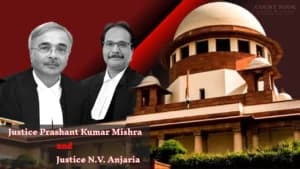The Supreme Court of India, on February 8, dismissed a Public Interest Litigation (PIL) that questioned the legality of provisions permitting students studying outside their home constituency to transfer their electoral enrollment to their place of education.
A bench comprising Chief Justice of India (CJI) Sanjiv Khanna and Justice Sanjay Kumar heard the matter and ruled that there was no substantial basis to proceed with the petition.
Court's Stand on Electoral Enrollment for Students
During the hearing, Justice Sanjay Kumar explained the two options available to students studying outside their native constituency:
They can travel back to their home constituency to cast their vote.
They can transfer their electoral enrollment to the constituency where they are pursuing their studies.
Read Also:- Supreme Court Orders CVC Probe into Illegal Appointments of Polytechnic Lecturers in Puducherry
The petitioner, PK Mullick, contended that allowing such transfers might lead to an uninformed electoral process. He argued:
"A student from Uttar Pradesh studying in Telangana would be totally disconnected from the political discourse. A temporary student is not concerned with the long-term development of the area, does not know the language, and may not fully understand the socio-political dynamics."
However, the Supreme Court disagreed with this view. CJI Sanjiv Khanna emphasized that enabling students to vote from their place of study ensures a meaningful expression of their electoral rights.
"Disallowing students to vote from their place of study would impact the overall voter turnout in elections. There are practical difficulties, given the large number of voters in India."
Read Also:- National Permit Remains Valid If Vehicle Is Within Its Registered State: Supreme Court
The issue of postal ballots was also discussed. CJI Khanna pointed out that even judges do not receive the privilege of postal ballots, as this facility is reserved for specific categories such as defense personnel and elderly citizens.
"Even we (judges) don’t get it (postal ballot provision). My brother (Justice Sanjay Kumar) was saying that even he has to travel back to his home constituency to cast his vote."
Justice Kumar further elaborated on the limitations of extending postal ballots to a broader category of voters:
"Where do we draw the line? People who are transferred or living elsewhere for various reasons could claim the same right. But the law does not provide for that."
The court also rejected the petitioner’s suggestion to implement Electronically Transmitted Postal Ballots (ETPB), which are currently available only for overseas Non-Resident Indians (NRIs).
After deliberation, the Supreme Court dismissed the petition, citing existing electoral laws. The bench noted:
"In view of the Manual of Electoral Rolls and Clause 13.6.1.3, we are not inclined to proceed further with this writ petition. The same stands dismissed."
Clause 13.6.1.3 of the Manual of Electoral Rolls provides clarity on students’ voting rights:
"Students residing as tenants at the place of study have the option to register as electors either at their native place with their parents/guardians or at the address of their hostel/lodge/landlord where they reside for the time being to pursue their studies."
Additionally, it stipulates that such registration transfers are permissible only if the student is enrolled in a recognized university.
Case Details: ARNAB KUMAR MULLICK vs. UNION OF INDIA W.P.(C) No. 000215 - / 2024














